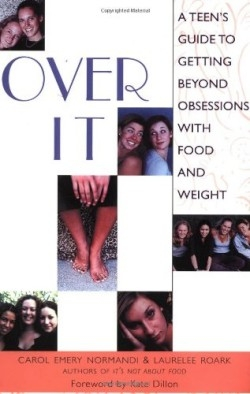Over It
A Teen's Guide to Getting Beyond Obsessions with Food and Weight
In the United States, thirty-one percent of nine-year-old girls are afraid of getting fat. Eighty-one percent of ten-year-old girls report the same fear. Ninety percent of female adolescents diet regularly. Why are our young women so obsessed with their weight? The authors of this workbook believe that American girls are taught to define their identity and worth by their weight, what they eat, and how much they exercise. Both Normandi and Rourk suffered from eating disorders that began when they were teenagers, and they offer this workbook as a device to start communication between teenagers and parents. (The authors also urge those parents who have a child with an eating disorder to first get help from physicians, nutritionists, and therapists.)
Comments from teenagers enliven the text. Tiffany observes: “I see my mom pinch her thighs and say ‘Oh, you are so ugly!’ and then I look in the mirror and see the same thing. How can I think that my thighs are anything but ugly too?” Amee notes: “No matter what’s going on or where I am, a million times a day, I tell myself how fat and totally gross I look. I could be walking down the street and see myself in the window and think ‘Oh my God, I look so fat!’ Or I may be at a party and I catch a glimpse of myself in the mirror and I think ‘I can’t believe how big my stomach is.’”
The authors define compulsive eating, bulimia, and anorexia nervosa with examples from their own pasts and examples from contemporary adolescents. Thoughtful exercises are provided in each chapter. Readers are urged to record their stories, beginning with the first time they felt bad about their bodies or felt bad about eating. There are exercises for observing eating patterns, determining your “hunger signal,” and accepting your body type.
Normandi and Rourk write, “As we listen to teen after teen talk about their experiences with food and weight, and as we watch them start to get a sense of who they are beneath the desire to be thin, we begin to wonder what would have happened to us if someone had come to our classroom and talked about eating disorders… we may not have been able to stop the behaviors right away, but we would have had another truth to hold onto, like a lifeline to bring us back to what mattered.” This guide is of value to families and educators.
Reviewed by
Rebecca Maksel
Disclosure: This article is not an endorsement, but a review. The publisher of this book provided free copies of the book to have their book reviewed by a professional reviewer. No fee was paid by the publisher for this review. Foreword Reviews only recommends books that we love. Foreword Magazine, Inc. is disclosing this in accordance with the Federal Trade Commission’s 16 CFR, Part 255.

